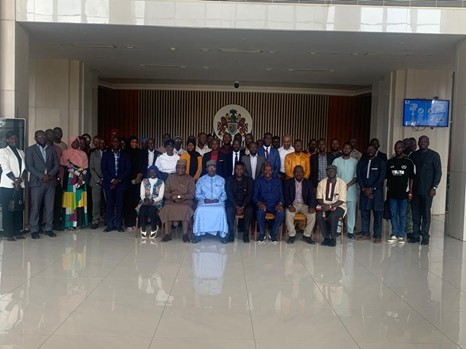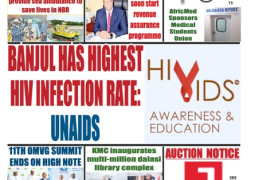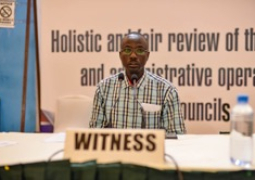
The training brought together over 60 participants from law enforcement, financial regulators, intelligence agencies, the judiciary, civil society, and the private sector at the Sir Dawda Kairaba Jawara Conference Center (SDKJ). It aims to develop a skilled cadre of national trainers capable of detecting, investigating, and disrupting terrorist financing networks without dependence on external facilitators.
The convergence covers topics ranging from financial intelligence and risk assessments to the protection of non-profit organisations, legal frameworks, and asset recovery.
The workshop also emphasised the growing political will and institutional maturity of the country in tackling these complex security challenges.
The event was opened with remarks from several key figures, who underscored the urgency of strengthening The Gambia’s financial systems to prevent exploitation by terrorist groups amid escalating violence across West Africa and the Sahel.
Prof. Abdullah Shehu, renowned consultant and former director general of GIABA, highlighted the country’s progress over the past 12 years, citing improvements in human capacity and institutional development.
He pointed out that The Gambia is now producing regional trainers who play an influential role across ECOWAS, a sign of its evolving leadership in the fight against illicit financial flows.
Omar Bojang, deputy national security adviser, emphasised the workshop’s importance for enhancing national security and stability.
He noted that while The Gambia remains free from active terrorist attacks, its geographic and economic vulnerabilities make it a potential target for transnational networks.
Bojang also referenced the ongoing second National Risk Assessment on money laundering and terrorist financing, which will help guide strategic policy and resource allocation.
For his part, Ousman Sowe, director general of the State Intelligence Services, painted a sombre picture of the regional security landscape. He described intensified militant activity across the Sahel in 2025, including deadly attacks by groups such as Jama’at Nusrat al-Islam Wal Muslimin , the Islamic State Sahel Province, and Islamic State West Africa Province.
Highlighting a recent brutal attack in northern Benin, Sowe stressed the critical role of disrupting terrorist financing to weaken these well-organised insurgent groups.
Muazu Umaru, GIABA’s director of Policy and Research, framed the training as a vital step in removing the “means” terrorists use to operate.
DG Umaru commended the Gambian government for its dedication and collaboration in hosting the workshop and underlined the necessity of regional and international cooperation to close gaps identified in The Gambia’s Mutual Evaluation Report.
He encouraged participants to fully engage with the curriculum, which includes topics such as risk assessment, financial intelligence, protection of the non-profit sector, and targeted financial sanctions.
Alagie Darboe, director general of The Gambia Financial Intelligence Unit (FIU), reiterated the FIU’s commitment to coordinating national efforts and strengthening systems to combat terrorist financing.
Darboe emphasised the importance of the workshop in complementing The Gambia’s ongoing national risk assessment and aligning operational capabilities with strategic priorities.
He highlighted the need for robust inter-agency cooperation and intelligence sharing, pointing out that sustainable progress depends on more than capacity building, stating that it requires an integrated approach involving all stakeholders.



